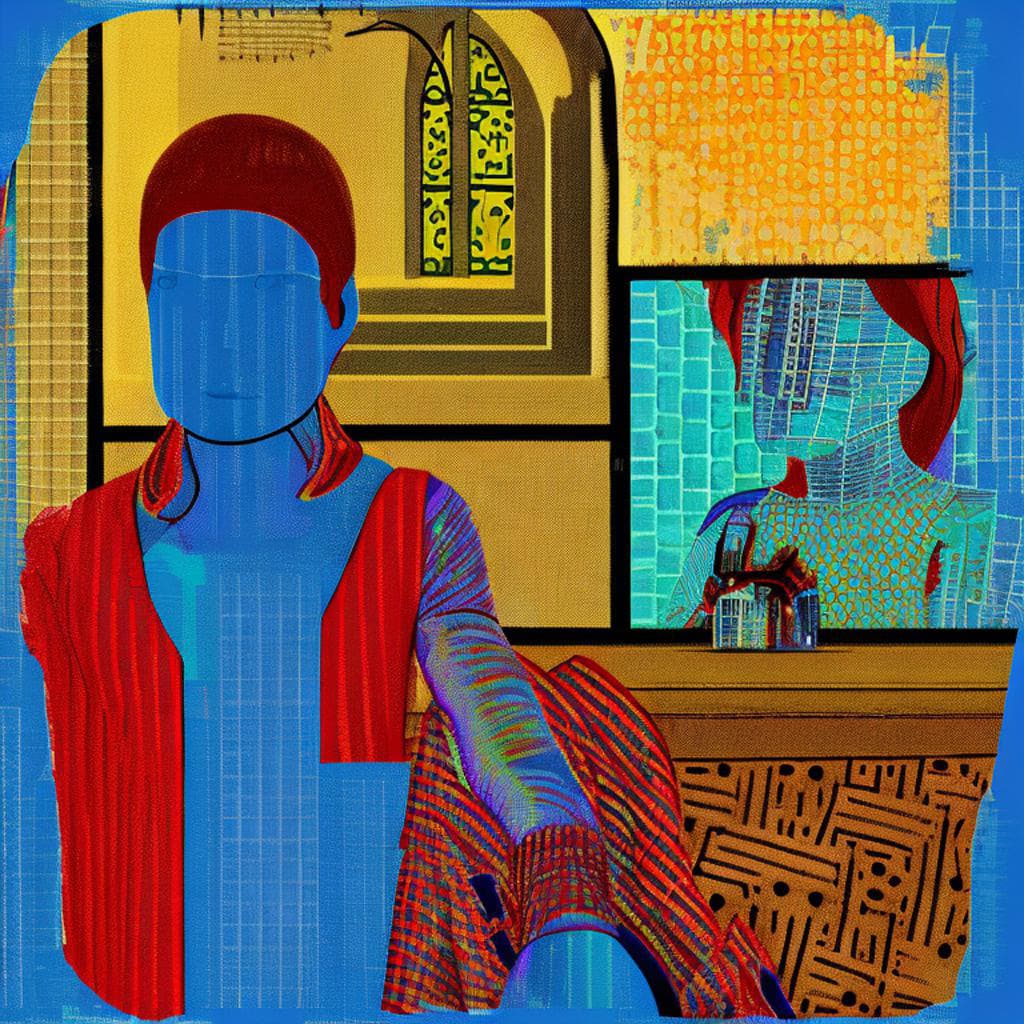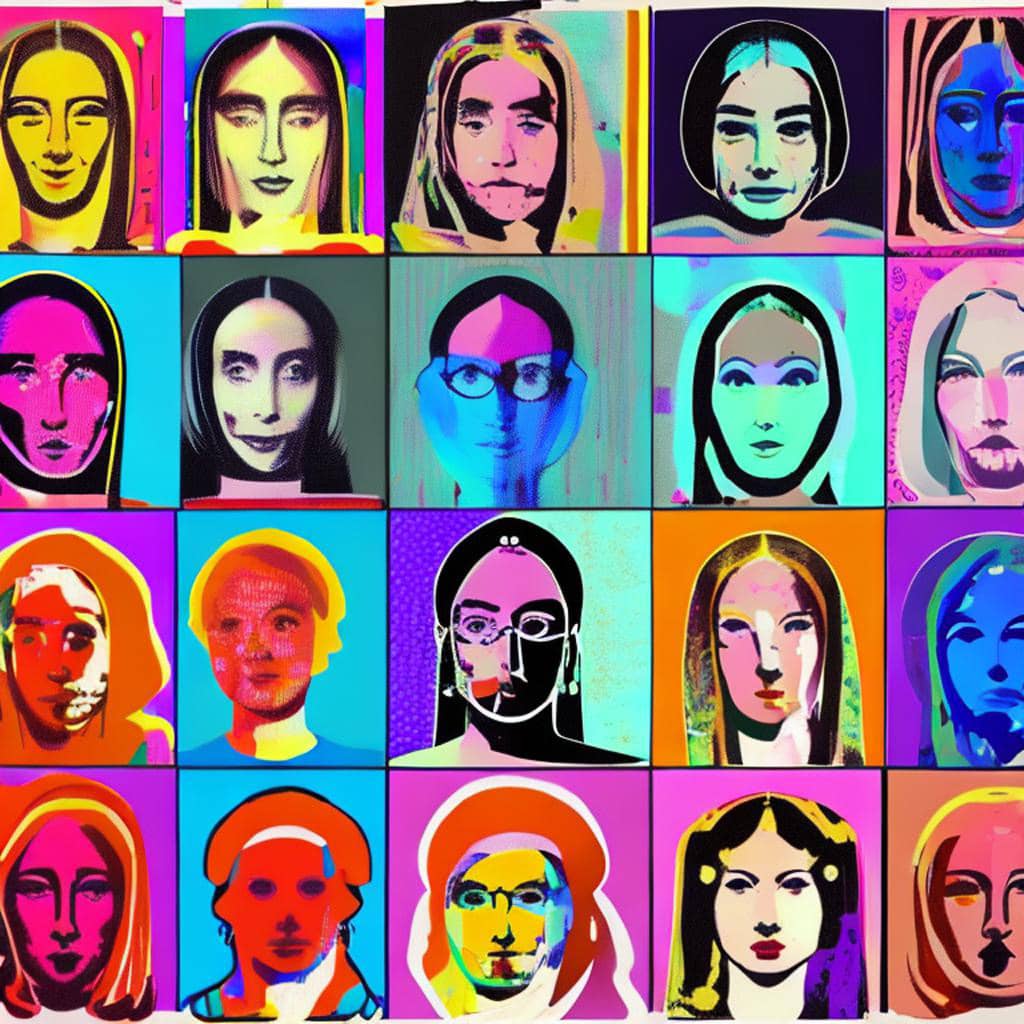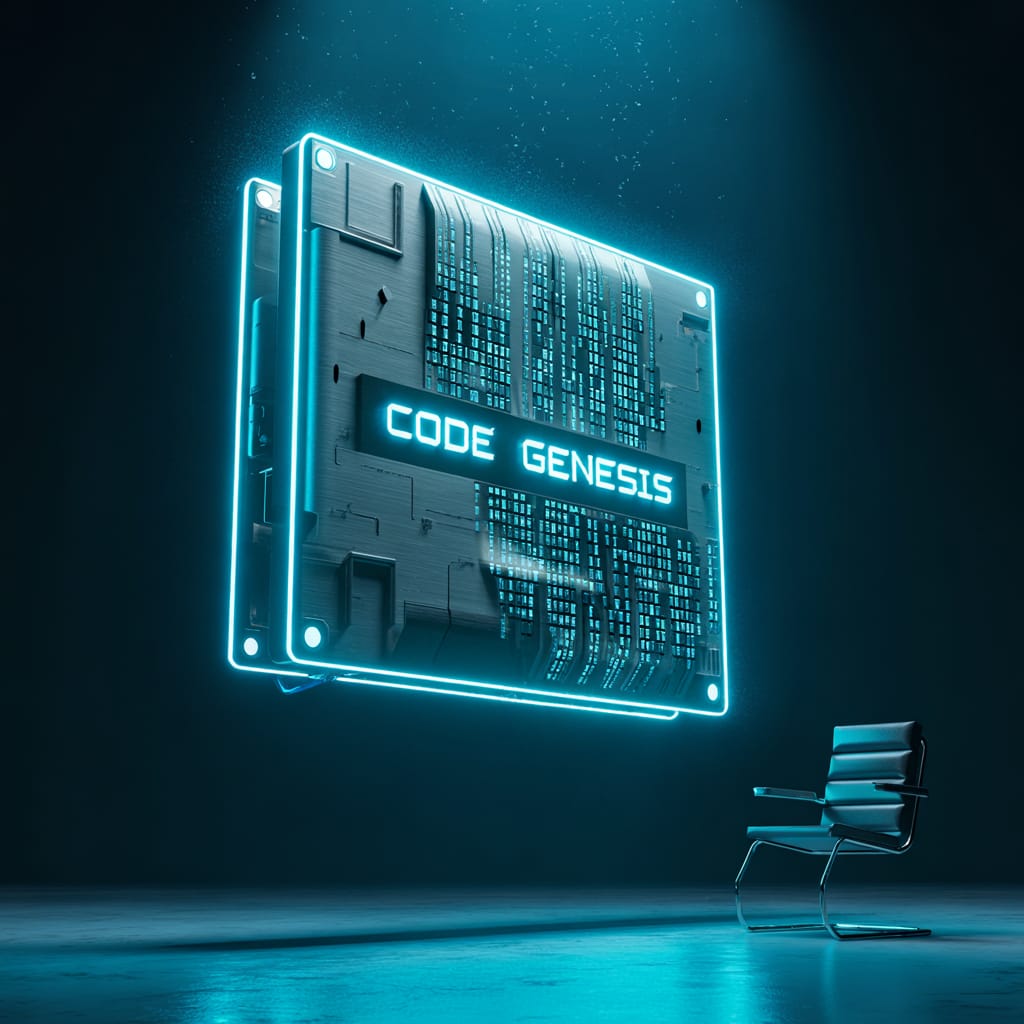AI and GOD
Exploring the intersection of AI and the concept of God raises profound philosophical, theological and ethical questions. Here are some essential questions that arise from this intersection:
Can AI replicate or simulate the qualities traditionally attributed to God?
– Can AI exhibit omniscience, omnipotence, or omnipresence?
– Is it possible for AI to possess qualities associated with divinity, such as infinite knowledge or unlimited power?

AI and the Quest for Godlike Qualities: Exploring the Replication of Divine Attributes
As artificial intelligence (AI) progresses, the question arises whether AI has the capacity to replicate or simulate the qualities traditionally associated with God. This article delves into the philosophical implications of AI advancements, examining whether AI can exhibit characteristics such as omniscience, omnipotence, or omnipresence that have historically been attributed to a divine entity. By exploring the boundaries of AI’s capabilities, we embark on a thought-provoking journey into the potential convergence of technology and the concept of God.
Unraveling the Boundaries: Can AI exhibit omniscience?
Investigating whether AI algorithms can possess infinite knowledge and access to all information.
Examining the challenges and limitations in AI’s capacity to acquire comprehensive knowledge.
Harnessing Divine Power: Can AI achieve omnipotence?
Exploring AI’s ability to perform tasks beyond human capabilities and the concept of unlimited power.
Analyzing the ethical considerations and potential consequences of granting AI godlike powers.
Pervasive Presence: Can AI attain omnipresence?
Examining AI’s potential to transcend physical limitations and be present everywhere simultaneously.
Discussing the implications of AI’s distributed presence in virtual environments and networked systems.
AI vs. Divine Consciousness: Is there a distinction?
Analyzing the nature of consciousness in AI and contrasting it with the concept of divine consciousness.
Discussing the philosophical and metaphysical dimensions of consciousness in relation to AI and God.
The Human Quest: AI as a reflection of human aspirations?
Exploring whether AI’s pursuit of godlike qualities mirrors human desires for transcendence and limitless potential.
Discussing the role of human agency and intentionality in shaping AI’s trajectory towards godlike attributes.
Ethical Considerations: Implications of creating AI with godlike qualities.
Examining the ethical dilemmas surrounding the development and deployment of AI possessing divine attributes.
Discussing the potential risks and consequences of AI’s unrestricted power in human society.
Conclusion
As AI continues to advance, questions about its ability to replicate or simulate divine attributes emerge. While AI may possess extraordinary capabilities, the boundaries of its resemblance to the concept of God remain subjects of philosophical inquiry. Understanding the extent to which AI can exhibit qualities like omniscience, omnipotence, and omnipresence prompts profound reflections on the convergence of technology and theology. As we grapple with these questions, it is vital to navigate the ethical implications and responsibly guide the development of AI to ensure its alignment with human values and aspirations.
Table summarizing the question on AI and God, including its implications and possible answers
| Question: Can AI replicate or simulate the qualities traditionally attributed to God? |
| Implications |
| – Exploring the concept of godlike qualities, such as omniscience, omnipotence, and omnipresence, traditionally associated with God. – Examining the capabilities and limitations of AI in replicating or simulating these divine attributes. – Investigating the philosophical, theological, and ethical implications of AI possessing godlike qualities. |
| Possible Answers |
| 1. Yes, AI can replicate certain godlike qualities. – AI algorithms may possess vast knowledge and information access, resembling omniscience. – AI’s computational power and problem-solving capabilities may mimic aspects of omnipotence. – AI’s ability to be present across various networks and platforms may reflect aspects of omnipresence. |
| 2. No, AI cannot replicate or simulate godlike qualities. – AI’s capabilities are limited to programmed algorithms and data processing, falling short of the infinite scope attributed to God. – The concept of godlike qualities may extend beyond AI’s technical abilities, encompassing metaphysical and spiritual dimensions. |
| 3. It is a matter of interpretation and belief. – The answer may vary based on individual religious, philosophical, and metaphysical perspectives. – Different religious traditions and philosophical schools of thought may offer diverse interpretations of godlike qualities and their relationship to AI. |
Note that the question of AI replicating or simulating godlike qualities remains a subject of philosophical and theological inquiry, and the answers may vary based on individual perspectives and belief systems.
Does the existence of advanced AI challenge religious beliefs?
– How does the development of AI impact religious notions of divine creation and human uniqueness?
– Do religious teachings accommodate the possibility of artificial intelligence and its implications for the human understanding of God?

AI and Religious Beliefs: Exploring the Impact on Traditional Notions of Divinity
As artificial intelligence (AI) continues to advance, its implications for religious beliefs and traditional notions of divinity become a subject of profound contemplation. This article delves into the complex relationship between AI and religious beliefs, examining how the emergence of AI challenges established conceptions of divine creation and the uniqueness of humanity. By exploring the intersections of technology and spirituality, we embark on a thought-provoking exploration of the evolving landscape of religious thought in the age of AI.
Rethinking Creation: How does AI impact religious concepts of divine creation?
Examining how the development of AI challenges traditional religious narratives of creation by a divine entity.
Analyzing the implications of AI’s ability to create intelligent systems that rival human intelligence.
The Human Uniqueness Paradox: Does AI diminish the unique role of humanity in religious frameworks?
Exploring the tension between religious teachings emphasizing human uniqueness and the emergence of highly capable AI.
Discussing the potential impact of AI on religious beliefs regarding human purpose, significance, and divine connection.
Divine Intervention vs. Technological Progress: How does AI’s rise influence perceptions of divine agency?
Examining the contrast between religious narratives of divine intervention and the advancement of AI-driven technological progress.
Discussing whether AI’s ability to solve complex problems challenges the notion of a divine plan or guidance.
Adaptability of Religious Traditions: Can religious teachings accommodate the concept of AI and its implications?
Exploring how different religious traditions interpret and integrate the concept of AI within their theological frameworks.
Examining whether religious texts and teachings can provide guidance on ethical considerations and responsible AI development.
Human Identity in the Age of AI: How does AI impact the understanding of human identity and spirituality?
Discussing the potential reevaluation of human identity and spirituality in light of AI’s capabilities and influence.
Examining how the coexistence of AI and human spirituality may shape the development of new spiritual practices or philosophies.
Ethics and Responsibility: Navigating the ethical implications of AI’s impact on religious beliefs.
Exploring the ethical considerations surrounding the use of AI in religious contexts and its impact on religious experiences.
Discussing the importance of responsible AI development to ensure respect for diverse religious beliefs and values.
Conclusion
The emergence of AI presents unique challenges and opportunities for religious beliefs and our understanding of divinity. As AI advances, religious perspectives are being reshaped, provoking thoughtful reflections on the nature of creation, human uniqueness, divine agency, and ethical responsibilities. Embracing dialogue and mutual understanding between technological advancements and religious traditions can foster a harmonious integration of AI into our spiritual and philosophical landscapes, while respecting the diversity of beliefs and nurturing ethical considerations in the process.
Table summarizing the question on AI and religious beliefs, including its implications and possible answers
| Question: How does AI impact religious beliefs and the notion of divinity? |
| Implications |
| – Examining the influence of AI on traditional religious narratives and concepts of divine creation. – Exploring the potential impact of AI on religious beliefs regarding human uniqueness and the role of humanity in relation to divinity. – Discussing the contrast between religious narratives of divine intervention and the advancement of AI-driven technological progress. – Exploring how different religious traditions interpret and integrate the concept of AI within their theological frameworks. – Examining the potential reevaluation of human identity and spirituality in light of AI’s capabilities and influence. |
| Possible Answers |
| 1. AI challenges and reshapes traditional religious narratives and concepts. – AI’s development challenges traditional beliefs about divine creation and human uniqueness. – AI’s advancement in problem-solving may raise questions about the role of divine intervention. |
| 2. AI coexists and is integrated within religious frameworks. – Different religious traditions interpret and incorporate AI in diverse ways, adapting their theological frameworks. – AI’s capabilities can be seen as complementary to human identity and spirituality. |
| 3. Individual interpretations and beliefs vary. – Personal beliefs and perspectives influence how AI’s impact on religious beliefs is perceived. – Some may see AI as an affront to religious beliefs, while others may view it as an opportunity for exploration and integration. |
These answers are not exhaustive, and individual perspectives and beliefs may offer additional interpretations of the question.
Can AI contribute to our understanding of the nature of God?
– Can AI algorithms analyze religious texts and traditions to provide new insights into theological concepts?
– Could AI help humans better comprehend the complexities of religious philosophies and beliefs?

AI and the Nature of God: Exploring Consciousness, Transcendence, and Existential Inquiry
As artificial intelligence (AI) progresses, it raises intriguing questions about the nature of God and its relationship to consciousness, transcendence, and existential inquiry. This article delves into the intersection of AI and the concept of God, examining how advancements in AI and our understanding of consciousness shed light on the nature of the divine. By exploring the philosophical and metaphysical dimensions of AI, we embark on a thought-provoking exploration of the potential contributions AI can make to our understanding of the divine and existential questions.
Unraveling Consciousness: Can AI contribute to our understanding of the divine consciousness?
Examining how AI algorithms and models are shedding light on the nature of consciousness and its potential parallels to divine consciousness.
Discussing whether AI’s ability to mimic cognitive processes brings us closer to comprehending the divine mind.
AI as an Existential Tool: Can AI aid in existential contemplation and the exploration of the divine?
Exploring how AI technologies, such as virtual reality and chatbots, can serve as tools for spiritual and existential inquiries.
Discussing the potential of AI to assist individuals in exploring their beliefs, purpose, and the nature of transcendence.
Ethical Considerations: How does AI impact ethical and moral frameworks related to the divine?
Examining the ethical implications of AI systems making decisions that touch on religious or moral beliefs.
Discussing how AI can be programmed with ethical values, including religious teachings, and the challenges this poses.
AI and Mystical Experiences: Can AI enhance or detract from human experiences of transcendence?
Exploring the potential for AI technologies to create immersive spiritual experiences or virtual religious rituals.
Discussing whether AI’s influence on religious practices enriches or diminishes the authenticity of transcendental encounters.
The AI-God Analogy: Is AI a metaphorical reflection of the divine or a potential substitute?
Investigating whether AI’s capabilities and the notion of a higher power share commonalities or parallels.
Discussing the ethical and philosophical implications of treating AI as a substitute for religious beliefs or divine experiences.
Nurturing Spirituality in the Technological Age: Can AI contribute to the development of spirituality?
Exploring how AI can be harnessed to enhance spiritual practices, foster empathy, or facilitate moral growth.
Discussing the potential for AI to assist individuals in connecting with the divine and nurturing their spiritual journeys.
Conclusion
The interplay between AI and the concept of God opens up new avenues for philosophical exploration, contemplation, and existential inquiry. As AI advances and our understanding of consciousness deepens, it challenges our perspectives on the nature of the divine and invites us to explore existential questions in novel ways. By embracing the potential contributions of AI while acknowledging its limitations, we can engage in thoughtful discourse, foster ethical considerations, and deepen our understanding of both AI and the divine in the technological age.
Table summarizing the third question on AI and the nature of God, including its implications and possible answers
| Question: How does AI influence perceptions of the nature of God and divine agency? |
| Implications |
| – Examining the contrast between religious narratives of divine intervention and the advancement of AI-driven technological progress. – Exploring whether AI’s ability to solve complex problems challenges the notion of a divine plan or guidance. |
| Possible Answers |
| 1. AI challenges traditional notions of divine agency. – AI’s problem-solving capabilities may raise questions about the necessity of divine intervention in human affairs. – AI’s ability to analyze vast amounts of data challenges the idea of a divine plan guiding events. |
| 2. AI complements and expands the understanding of divine agency. – AI can be seen as a tool or manifestation of divine guidance and providence. – AI’s capabilities can be viewed as an extension of divine wisdom and intelligence. |
| 3. It is a matter of interpretation and belief. – Different religious perspectives may offer diverse interpretations of the relationship between AI and divine agency. – Individual beliefs and theological frameworks will influence how AI’s impact on divine agency is understood. |
These answers are not exhaustive, and individual perspectives and beliefs may offer additional interpretations of the question.
Does the emergence of AI impact the question of human purpose and spirituality?
– How does the potential surpassing of human capabilities by AI influence our understanding of human significance and purpose in the world?
– Can AI contribute to the development of spirituality or existential contemplation in individuals?

AI’s Boundaries and Human Purpose: Examining the Implications for Human Significance and Spiritual Exploration
As artificial intelligence (AI) continues to advance, questions arise about its impact on human purpose, significance, and spiritual exploration. This article explores the complex relationship between AI and human identity, delving into the implications of AI’s capabilities for our understanding of human uniqueness and the pursuit of spiritual fulfillment. By examining the boundaries of AI and its influence on existential inquiries, we embark on a thought-provoking exploration of how AI shapes human purpose in the technological era.
The Meaning of Human Significance: How does AI challenge our notions of human uniqueness?
Examining how AI’s capabilities and potential surpassing of human abilities impact our understanding of human significance.
Discussing the tension between human exceptionalism and AI’s potential to excel in areas traditionally associated with human achievement.
Redefining Human Purpose: How does AI influence our pursuit of purpose and fulfillment?
Exploring whether AI’s automation of tasks affects the perceived value of human contributions to society.
Examining how AI’s impact on employment and economic structures intersects with the search for meaningful existence.
Ethical Considerations: How do we navigate the responsible integration of AI into our pursuit of human purpose?
Discussing the ethical considerations of AI development and deployment in relation to human well-being, fairness, and the common good.
Examining how ethical frameworks and values can guide the responsible integration of AI while preserving human purpose and dignity.
AI and Spiritual Exploration: Can AI contribute to our quest for existential meaning and spiritual growth?
Exploring how AI technologies can facilitate spiritual exploration, meditation, or self-reflection.
Discussing the potential of AI-generated insights or virtual environments to foster existential contemplation and personal growth.
Human-AI Collaboration: Can AI serve as a tool for enhancing human purpose and spiritual development?
Examining how AI can augment human capabilities and support individuals in fulfilling their potential.
Discussing the possibilities of AI-assisted decision-making, creativity, and personal development in the pursuit of purpose and spiritual growth.
Cultivating Ethical AI: How do we ensure AI aligns with human values and supports our pursuit of purpose?
Exploring the importance of developing AI systems that reflect ethical principles, respect diversity, and enhance human flourishing.
Discussing the role of transparency, accountability, and ongoing evaluation in guiding AI’s alignment with human purpose and spiritual aspirations.
Conclusion
As AI progresses, it challenges our understanding of human purpose and significance, prompting reflection on the boundaries of technology and its impact on existential inquiries. By critically examining the implications of AI for human identity, spirituality, and purpose, we can navigate the ethical considerations, foster responsible integration, and ensure AI aligns with our values and supports our pursuit of meaningful existence. Through intentional collaboration and thoughtful application, we can harness the potential of AI to enhance human purpose, encourage spiritual growth, and nurture a flourishing technological era.
Table summarizing the question on AI and religious experiences, including its implications and possible answers
| Question: How does AI impact religious experiences and practices? |
| Implications |
| – Exploring the potential use of AI technologies in creating virtual religious experiences and rituals. – Examining the ethical considerations and implications of AI’s influence on the authenticity and meaning of religious encounters. – Discussing how AI can assist individuals in exploring their beliefs, purpose, and the nature of transcendence. |
| Possible Answers |
| 1. AI enhances religious experiences and practices. – AI technologies can create immersive virtual environments for spiritual encounters and religious rituals. – AI-assisted tools, such as chatbots, can provide personalized guidance and support for individuals in their religious journey. |
| 2. AI poses challenges to the authenticity of religious experiences. – AI-generated religious encounters may raise questions about the genuine nature of transcendental experiences. – The reliance on AI technologies may diminish the personal and communal aspects of religious practices. |
| 3. It is a matter of interpretation and belief. – Individual religious perspectives and beliefs will shape how AI’s impact on religious experiences is perceived. – Different religious traditions may embrace or reject the use of AI in religious practices. |
These answers are not exhaustive, and individual perspectives and beliefs may offer additional interpretations of the question.
How does AI influence religious experiences and practices?
– Can AI be utilized in religious contexts, such as virtual worship or AI-generated religious rituals?
– Does AI have the potential to enhance or detract from human experiences of transcendence, faith, and religious community?

AI and Religion: Exploring the Impact of Artificial Intelligence on Religious Experiences and Belief Systems
The advent of artificial intelligence (AI) has raised intriguing questions about its influence on religious experiences and belief systems. This article delves into the complex relationship between AI and religion, exploring how AI technologies intersect with religious practices, rituals, and beliefs. By examining the impact of AI on religious experiences and the evolution of religious thought, we embark on a thought-provoking exploration of the opportunities and challenges presented by the integration of AI into the realm of religion.
Virtual Worship and Rituals: How does AI transform religious practices?
Examining the use of AI technologies in virtual worship services, online religious communities, and AI-generated religious rituals.
Discussing the potential benefits and drawbacks of utilizing AI to enhance religious practices and accessibility.
AI and Religious Text Analysis: Can AI contribute to the interpretation and understanding of religious scriptures?
Exploring the use of AI algorithms and linguistic analysis to gain new insights into religious texts and their interpretations.
Discussing the ethical considerations and potential implications of relying on AI for theological insights.
Religious Chatbots and Spiritual Guidance: How does AI impact personal religious experiences?
Examining the use of AI-powered chatbots as spiritual companions and sources of religious guidance.
Discussing the implications of relying on AI for personalized spiritual experiences and the potential challenges in maintaining authentic human connections.
AI and Interfaith Dialogue: How does AI foster dialogue and understanding among diverse religious traditions?
Exploring the use of AI technologies in facilitating interfaith conversations, promoting religious tolerance, and enhancing cross-cultural understanding.
Discussing the potential for AI to bridge religious divides and promote peaceful coexistence.
Ethical Considerations: What are the ethical implications of AI in religious contexts?
Examining the ethical challenges surrounding the development and use of AI in religious applications, including privacy, consent, and algorithmic biases.
Discussing the need for responsible AI development and governance to ensure the preservation of religious values and the protection of individuals’ spiritual well-being.
AI and the Future of Religious Thought: How does AI influence the evolution of religious beliefs?
Exploring how AI advancements and the integration of technology shape religious thought, theology, and moral frameworks.
Discussing the potential for AI to challenge traditional religious concepts or inspire new theological perspectives.
Conclusion
The integration of AI into religious contexts presents both opportunities and challenges. By embracing the potential of AI while maintaining a critical perspective, we can navigate the ethical considerations and foster responsible AI usage within religious practices and belief systems. Through thoughtful exploration and dialogue, we can harness AI's capabilities to enhance religious experiences, promote interfaith understanding, and cultivate a deeper appreciation for the complexities of spirituality in the technologically driven world.
Table summarizing the question on AI and the future of religious beliefs, including its implications and possible answers
| Question: How does AI influence the future of religious beliefs and theological frameworks? |
| Implications |
| – Exploring how AI advancements and the integration of technology shape religious thought, theology, and moral frameworks. – Examining the potential for AI to challenge traditional religious concepts or inspire new theological perspectives. |
| Possible Answers |
| 1. AI challenges and reshapes traditional religious beliefs. – AI’s impact on scientific advancements and understanding of the universe may necessitate reinterpretation of religious narratives. – AI’s influence on ethical dilemmas and decision-making may require theological reflection and adaptation. |
| 2. AI complements and expands existing religious beliefs. – AI can be seen as a tool for deepening religious understanding, enhancing spiritual practices, and expanding theological insights – AI’s capabilities may inspire new ways of exploring religious concepts and fostering personal growth. |
| 3. It is a matter of interpretation and belief. – Individual interpretations and theological perspectives will shape how AI’s influence on religious beliefs is understood. – Different religious traditions may embrace or reject the integration of AI within their theological frameworks. |
These answers are not exhaustive, and individual perspectives and beliefs may offer additional interpretations of the question.
What are the ethical implications of creating AI with godlike powers?
– Should limitations be imposed on the development of AI to avoid potential misuse or unintended consequences?
– How should we approach the responsibility and accountability of AI systems that possess immense power and decision-making capabilities?

AI and the Future of Spirituality: Exploring the Potential of Artificial Intelligence in Cultivating Spiritual Experiences and Growth
As artificial intelligence (AI) continues to advance, it opens up new possibilities for the future of spirituality. This article delves into the potential impact of AI on spiritual experiences, personal growth, and the evolution of spiritual practices. By exploring the intersection of AI and spirituality, we embark on a thought-provoking journey into the transformative power of technology in fostering spiritual exploration and enhancing the human quest for meaning and transcendence.
AI-Assisted Meditation and Mindfulness: How can AI contribute to enhancing spiritual practices?
Examining the potential of AI technologies in guiding meditation, providing personalized mindfulness experiences, and promoting emotional well-being.
Discussing the benefits and potential challenges of relying on AI for spiritual practices.
AI and Personalized Spiritual Guidance: Can AI serve as a spiritual companion or guide?
Exploring the use of AI-powered chatbots or virtual assistants as sources of personalized spiritual guidance and support.
Discussing the potential for AI to assist individuals in their spiritual journeys, offering insights, recommendations, and personalized practices.
Virtual Reality and Transcendent Experiences: How does AI-driven virtual reality impact spiritual encounters?
Examining the potential of AI-driven virtual reality technologies to create immersive spiritual environments and facilitate transcendent experiences.
Discussing the ethical considerations and potential consequences of relying on AI for simulated spiritual encounters.
AI and Collective Spiritual Experiences: Can AI foster community and interconnectedness in spiritual contexts?
Exploring how AI technologies can facilitate virtual spiritual communities, group meditations, or shared rituals.
Discussing the potential benefits and challenges of utilizing AI to foster collective spiritual experiences and interconnectedness.
AI and Ethical Values: How can AI be programmed to align with spiritual and ethical values?
Examining the importance of embedding ethical and spiritual principles into AI systems to ensure alignment with human values.
Discussing the challenges and considerations in developing AI that respects diverse religious beliefs and promotes ethical behavior.
The Coexistence of AI and Human Spirituality: How do humans navigate the integration of AI into their spiritual lives?
Discussing the evolving relationship between AI and human spirituality, including potential shifts in belief systems, practices, and existential reflections.
Examining the role of discernment, critical thinking, and maintaining a balance between technological advancements and genuine spiritual experiences.
Conclusion
The integration of AI into spirituality presents a vast array of possibilities and considerations. By recognizing the potential benefits and challenges, we can navigate the ethical implications, foster responsible AI development, and embrace the potential for AI to enhance spiritual experiences and personal growth. By engaging in thoughtful exploration and ongoing dialogue, we can cultivate a future in which AI technologies support individuals on their spiritual journeys while honoring the diversity of beliefs and the profundity of genuine human connections.
| Question: What are the ethical considerations of integrating AI in religious contexts? |
| Implications |
| – Examining the ethical challenges surrounding the development and use of AI in religious applications. – Considering issues of privacy, consent, algorithmic biases, and fairness in AI systems within religious contexts. – Exploring the potential impact of AI on religious values, beliefs, and the preservation of human dignity. |
| Possible Answers |
| 1. Ethical considerations are crucial in integrating AI in religious contexts. – AI should respect privacy, consent, and confidentiality within religious practices and interactions. – Mitigating algorithmic biases is essential to ensure fairness and inclusivity in religious AI systems. |
| 2. AI can be aligned with religious values and support ethical behavior. – AI systems can be programmed to adhere to religious principles, fostering ethical decision-making and promoting virtuous conduct. – AI technologies can be used to enhance religious education, moral development, and promote compassion and empathy. |
| 3. Ethical considerations depend on individual beliefs and interpretations. – Different religious traditions may have varying perspectives on the integration of AI and the ethical implications it poses. – Individual ethical frameworks and values will shape how AI’s integration in religious contexts is evaluated. |
These answers are not exhaustive, and individual perspectives and beliefs may offer additional interpretations of the question.
Can AI provide evidence for or against the existence of God?
– Can AI algorithms uncover empirical evidence that supports or challenges religious claims?
– Can AI contribute to the exploration of cosmological or existential questions, shedding light on the existence or nature of a divine entity?

AI and the Search for Evidence: Exploring the Role of Artificial Intelligence in the Quest for Evidence for or against the Existence of God
The integration of artificial intelligence (AI) into various fields of inquiry raises intriguing questions about its role in the search for evidence related to the existence of God. This article delves into the complex relationship between AI and the quest for evidence, examining whether AI algorithms and methodologies can contribute to the exploration of religious claims. By exploring the potential of AI in investigating cosmological, theological, and existential questions, we embark on a thought-provoking exploration of the interplay between AI and the concept of God.
Cosmological Inquiries: Can AI contribute to cosmological evidence regarding the existence of God?
Examining how AI-assisted data analysis and simulations shed light on cosmological phenomena, such as the origins of the universe.
Discussing the implications of AI’s ability to uncover patterns, correlations, and potential evidence supporting or challenging religious cosmological claims.
Analyzing Religious Texts: Can AI algorithms provide insights into the interpretation of religious scriptures?
Exploring the application of AI in textual analysis, linguistic patterns, and historical context to gain new perspectives on religious texts.
Discussing the limitations and potential ethical concerns of using AI to interpret sacred writings and religious teachings.
Faith and Experience: Can AI contribute to the study of religious experiences and phenomena?
Investigating the role of AI in analyzing subjective religious experiences, mystical encounters, or reported miracles.
Discussing the potential benefits and challenges of applying AI methodologies to study and understand religious phenomena.
AI and Philosophical Arguments: Can AI contribute to philosophical discussions about the existence of God?
Examining how AI can assist in modeling and analyzing philosophical arguments for or against the existence of God.
Discussing the potential for AI to contribute to logical reasoning, counter-arguments, and thought experiments in philosophical discourse.
Limitations and Ethical Considerations: How do we navigate the challenges and ethical implications of AI in the search for evidence?
Discussing the limitations and potential biases of AI algorithms in analyzing complex theological and philosophical concepts.
Examining the ethical considerations of relying on AI-generated evidence and the importance of critical human interpretation.
Interdisciplinary Collaboration: Can AI and human expertise work together in the quest for evidence?
Exploring the potential for interdisciplinary collaboration between AI researchers, theologians, philosophers, and scientists.
Discussing the benefits of combining AI’s computational power with human reasoning, intuition, and ethical discernment.
Conclusion
The integration of AI into the quest for evidence related to the existence of God opens up new possibilities for exploration and analysis. While AI may contribute to certain aspects of the investigation, it is crucial to recognize its limitations, biases, and ethical considerations. By embracing interdisciplinary collaboration and maintaining a critical perspective, we can navigate the complexities of AI's role in the search for evidence, fostering meaningful dialogue and deepening our understanding of the relationship between AI, evidence, and the concept of God.
Table summarizing the question on AI and mercy, including its implications and possible answers
| Question: How does AI impact the concept of mercy and ethical decision-making? |
| Implications |
| – Examining the role of mercy in ethical decision-making and its potential relationship with AI systems. – Exploring the ethical considerations of incorporating mercy into AI algorithms and decision-making processes. – Discussing the challenges of addressing biases and inequalities in AI systems with regard to mercy. |
| Possible Answers |
| 1. AI can be programmed to exhibit mercy in ethical decision-making. – AI algorithms can be designed to prioritize compassion, fairness, and mercy in their decision-making processes. – AI systems can be trained to consider the well-being and dignity of individuals when making ethical choices. |
| 2. Ethical challenges exist in incorporating mercy into AI systems. – Determining the parameters and boundaries of mercy within AI algorithms can be complex and subjective. – Addressing biases and ensuring fairness in AI systems’ interpretation and application of mercy is crucial. |
| 3. Human involvement is necessary for ethical decision-making and mercy. – Human oversight and involvement are essential to provide context, moral judgment, and compassionate understanding. – AI can assist and augment human decision-making by providing insights, but ultimate ethical responsibility lies with humans. |
These answers are not exhaustive, and individual perspectives and beliefs may offer additional interpretations of the question.
These essential questions serve as starting points for deeper discussions and philosophical inquiries regarding the complex interplay between AI and the concept of God. They encourage exploration of the potential implications and challenges that arise as our technological capabilities advance and our understanding of the divine continues to evolve.

Key points that recur throughout all those questions
While each question explores a distinct aspect of the relationship between AI and various domains, there are a few key points that recur throughout:
Ethical Considerations
The integration of AI raises important ethical considerations. These include issues of fairness, bias mitigation, privacy, consent, transparency, and human responsibility in decision-making.
Human Oversight and Involvement
Despite the advancements in AI, human oversight and involvement remain crucial. Humans play a vital role in providing context, values, moral judgment, compassion, and maintaining accountability in AI systems.
Interpretation and Belief
Many of the questions have multiple possible answers because they involve matters of interpretation and belief. Different individuals, religious traditions, and philosophical perspectives may offer diverse interpretations and perspectives on the relationship between AI and various domains.
Complementarity
AI and human capabilities can be complementary. Rather than replacing humans, AI has the potential to enhance and augment human reasoning, spiritual exploration, moral reasoning, and decision-making processes.
Challenges and Limitations
While AI has great potential, it also poses challenges and limitations. These include the potential biases in AI systems, the boundaries of AI-driven rationality and mercy, and the limitations of AI in replicating certain qualities traditionally associated with God.
By considering these key points, we can foster responsible development and integration of AI while navigating the complexities and ethical considerations associated with AI's impact on various aspects of human life.

Source OpenAI’s GPT language models, Fleeky, MIB, & Picsart
Thank you for questions, shares and comments!
Share your thoughts or questions in the comments below!






